U2 beats the heat & rain & wins over the “two Floridas”!
June 16, 2017
During the current Joshua Tree tour, perhaps no pair of stops would be as intriguing as Miami and Tampa, embodying the “two Americas” theme of the album and theme of these times.
The state of Florida is as different and diverse as any state in America. Taking the famous I-4 Corridor that connects Orlando and Tampa as a separator, North and South Florida are geographically, culturally, and politically different. Here in the same state, we have different political bases as “red” as Texas (Central and North Florida) and as “blue” as California (South Florida). Every election year, the Sunshine State is an all-important ‘tossup’ state.
Catering to both demographics in the span of 4 days (Miami’s Hard Rock Stadium on June 11th and Tampa’s Raymond James Stadium on June 14th), the Irish lads brought their sold-out Joshua Tree tour here after a month on the road. Now, the setlist has been polished, the transitions are perfected, and the show sears and soars like a well-oiled machine.
In Miami, the summer humidity didn’t stop 60,000 faithful from packing every seat of (the aptly named) Hard Rock Stadium where Larry Mullen Jr got the party started at 8:45 pm. With an energy coming from fans who came from what seemed like every South American country, the band channeled that fuel into a cracking first set that was only derailed by some severe guitar issues from The Edge during “Pride.” Guitar issues and some visible frustration from The Edge could not stop the show as soon the 200-ft. screen finally lit up with an 8K ultra high-definition red that would set the stadium on fire a few seconds later.
This tour is without a doubt the more political of the past few tours and the crowd reaction to the blunt criticism of the current administration went mostly well in Miami, even with an awkward shout-out to Senator Marco Rubio. But would the reception be the same in Tampa a few days later?
When the tour got to Tampa, we saw the central Florida city soaking in a day of thunderstorms and torrential summer downpours. At one point in the general admission line, rumors were floating the show may had to be canceled if thunder and lightning were within 8 miles of Raymond James Stadium.
Fortunately for the Joshua Tree, God was with Tampa, and the show went on as planned, returning to the city where Tampa Stadium had the original tour in 1987. Even a big, brilliant double-rainbow adorned and decorated the stadium as OneRepublic took the stage to warm up the crowd.
Once the thousands settled into their seats, it was clear that this would be a different show than Miami. From the very beginning as Adam Clayton swayed the rhythm of “New Year’s Day,” Bono was already reaching out the more conservative crowd (as he previously did in Texas). “Left, right and in between. Everyone is welcomed here”!
Maybe it was the fresh rainy weather a few hours prior, or the breeze that hit the stadium shortly after the show began, but Bono was chatty, joyous, and a bit nimbler than in the humidity and sweat of a few nights prior. For “One Tree Hill,” Bono told the story of Greg Carroll before dedicating it on this night to the city of Orlando “for the Pulse nightclub and the 49 souls that were taken away.”
As expected, a few criticisms from fans came during political sections of the show, including a St. Petersburg resident who said: “Don’t they know we just want to hear some good music and no politics? Or a local Tampa couple who bluntly said that Bono “didn’t care for the audience” by assuming they agree with him on everything.
Both setlists were identical, including what might be the new closer for this tour: “Vertigo.”
As much as some fans complain that “Vertigo” is overplayed and the song should be dropped, it was clear from the reception both nights, that it set the crowd on fire. Perhaps alternating with “I Will Follow” and a new song, “Vertigo” is likely not going anywhere.
All in all, U2 provided the Sunshine State with two magnificent shows, yet very different ones. The politics may differ in these cities, but our love for U2 and Joshua Tree songs is something we all have in common.
-Jaime Rodriguez, @jrodconcerts https://www.jrodconcerts.com/
U2′s Joshua Tree Revival Hits Texas Big Tents
June 1, 2017
As cheesy as Bono’s slogans are, I love them all. As annoying as his pleas for peaceful dialogue and post-partisan unity are, I need them every time. As he has said before, compromise is not a dirty word. Neither us nor them: only we the people who follow this band, across this land.
On this Joshua Tree anniversary tour, reaching the masses in the massive venues of North America through July 1 and Europe through August 1, Bono has said these are concrete temples, these football stadiums. In the Texas heat, the concrete cathedrals are big tents, with the retractable roof in place and the AC turned up. By Friday in Dallas, temperatures rose to the mid 90s, so we were glad to be indoors. On my first Joshua Tree adventure with my teenage self in 1987, I skipped the Texas shows. This time, Houston and Dallas were my second and third shows of five.
Tracks from War and Unforgettable Fire serve up such a great prelude on the tree stage, but the humming, rising, intoxicating intro to Streets is when church begins. During “Sunday Bloody Sunday,” he wants to wipe our “Manchester tears away,” a reference to the terrorist attack on May 22 after an Ariana Grande concert in Manchester, England. Since Bono has added the original “No War” chant to the recurring “No More” chant, it’s like I am back in the basement on Timberline, mind blown and body shaken and spirit moved by the Blood Red Sky VHS tape I dubbed off MTV. As “Pride” winds down and “Streets” revs up, Bono is preaching. For the frontman, the true radical is straight down the middle of the road. Everyone is welcome in this tent, for the “furious and faithful” are an America based on “joy and justice, compassion and community, rescue and refuge.”
For tonight, common ground is higher ground, Hewson teaches and preaches. For fans, the Joshua Tree portion of the show, the main act, that is higher ground. The reality that for some of us fans, the Holy Spirit always knows how to show up for “Where The Streets Have No Name.” But I cannot dance like this at the mainline churches I’ve attended, so for two Texas nights, I let the spirit take over. The concrete mainfloor of this concrete temple became a charismatic church aisle. Even though you can get a really good spot up front arriving as late as 6pm, I like to wander and hang out at the back, so I can work it out, rocking solo, prayers and emotions, dancing like nobody’s watching, throughout each part of the set. Back where a fan has plenty of room, I saw I was not alone in my own private dance party, as a young child and her mother practiced the latest moves learned at dance class. I started seeing this band with my parents. It’s just amazing how the shows bring us all together.
For most of the last three decades, “With Or Without You” or “I Still Haven’t Found What I’m Looking For” are highlights of any U2 set they appear in. Same for the psychedelic growl of “Bullet the Blue Sky,” which for once is in its more traditional form, after countless recontextualizing over the intervening years. I’m not saying I don’t love the first side of Joshua Tree, all the way through “Running To Stand Still,” but these are all huge U2 songs that nobody would be surprised to hear in any concert on a recent tour. For example, during the Vertigo tour which I caught four times in 2005, you could expect to hear three or four of them on a given night, and all five of the first side were in rotation.
But side two, well that is a different story. These are all hardcore rarities. Had they not announced this special tour, I would have expected to never hear any of these songs again. Sure, I might have been surprised by the occasional appearance of “In God’s Country” or “One Tree Hill,” but even for the dedicated fans coming to these shows, this second side feels like something from another planet or at least time zone, a secret show that you won in a radio or TV lottery or that only popped up in your dreams.
“Red Hill Mining Town” is all chills and thrills, and the shivers continue until the encore break. “In God’s Country” refers not just to the panoramic landscapes, seen on the big screen as visuals so grand in the hand of Anton Corbijn, but also, according to Bono, to the interior landscapes of our psychological and spiritual reality. That’s what so surreal and even psychedelic about this show, there’s the invocation of something utopian, not either side of the “two Americas” but the cosmic American dreamscape of a better place that does not deny the bitter place.
The thorny and corny romp called “Trip Through Your Wires” has always been one of my all-time favorite U2 deep tracks. It’s equal parts sanctified and raunchy, rebellious yet holy, and I am not talking about the bikini-clad model seen by all of us and seeming out-of-place on a U2 big screen. The kind of thirst Bono invokes is inherently sacred, and he knows as well as any, that the required drink of water might come from an angel or a devil, from a lover or from God’s thunder and rain.
The always talkative Bono didn’t talk as much during the Joshua Tree tracks, but that may be changing as the tour moves on. In Houston, before “One Tree Hill,” he quoted the recent track “California,” saying, “There is no end to grief because there is no end to love.” On Friday night, before the same song, he talked about its origins in New Zealand, and he referenced Greg Carroll, the U2 crew member for whom the song is dedicated. “For anyone who has been robbed of a beautiful soul, we are going to sing this for you.” The hole in U2’s collective heart always finds the hole in our hearts, until we stumble to wholeness together. The healing might be temporary, but it’s real.
In honesty, on many private listens to the longtime favorite album, I would consider “One Tree Hill” to be the closing song. I know there are two more tracks, but they don’t get me on the album. But at this live revival, I didn’t sprint for the men’s room. Perhaps a dark conclusion is needed. After an archival film clip that parodies America’s 45th president, “Exit” begins. Bono reappears in a big black hat, begging us into a harrowing narrative of harm. This is a bad trip, like the brown acid at Woodstock. Our burdened brains receive a sucker-punch of adrenalin and dementia, so suddenly you are stuck in a mega-church gone wrong with psychotic pit-bull evangelism. The rest of the set will provide a suitable exorcism, be reassured.
After that bad-boy sadistic satisfaction of “Exit” as intentional trainwreck travesty, “Mothers of the Disappeared” still shows up as a solemn tribute. We could sing it for any mother and every mother. But mothers of sons cut down too soon by brutality, they need this song. When Bono took off his hat, bowed his head, and raised his fist, it’s like I could see that 1987 ponytail again. It’s the young man inside the old man from Dublin, said the young man inside this fan-man who chased this band back then and chases this band now.
At Houston, when they moved “Miss Sarajevo” and “Bad” to the first encore spot, this meant I could have my stupid-cry all in one place. These songs prompted me to bawl for different reasons, the first for collective grief, the latter for spiritual relief. The early “Bad” in Dallas was also dynamic, if a little disconcerting, as that track always felt like it fit in the middle or end of a set.
After first seeing the show in northern California, I frankly didn’t anticipate how well the Syria footage and Omaima plea would play in a place like Texas. So in Houston, I turned my back to the stage and walked towards the fans, scanning faces both on the floor and in the stands. I saw more tears, some quizzical but mostly sincere and solemn gazes of people drinking in the predicament of how wrong this world can be when we abandon our better selves for selfish systems. The singing about surrender promises at least one solution. Get out of self, get out there and help others.
Thanks to more setlist rearranging in Dallas, this meant that on Friday night, my two Texas shows in three days would end with a crescendo. “Beautiful Day” is always a beautiful thing, even in this rainbow-colored, space-age rendition. Now don’t get me wrong, I love the new track, “The Little Things That Give You Away,” but it feels like an odd way to end this show. I just wish they would release the next album already! So after “Beautiful Day,” the call of the exit ramps echoed in my gut, the tug of the idea of beating some traffic back to my AirBNB. By the time they finished an energizing “Elevation,” which is always better live, which always feels like I am at the gym, getting my workout on and hard, I had left the GA mainfloor and was bouncing around the concourse, close to the doors. So when Bono said “We can do this” and pulled an improvisational audible call for “I Will Follow,” it sent me into happy, zappy boyhood orbit once again. An usher and I danced on the outskirts, each of us in our own personal head and heart zone of rocking, sonic, cosmic, boundless, bounding bliss.
Leaving a U2 always comes with mixed feelings. This concert left me exhilarated, but I regret that my current run with them has already passed its halfway point. Three shows down, two remaining! This hobby costs more than it did in 1987, so I am grateful to my two jobs for the flexibility and income and my dear family for the support they offer me in zipping around to these gigs. -Andrew William Smith, @teacheronradio
Photos are from Pasadena shows, by Justin Kent. http://www.justin-kent.com/
First Tree Reflections 2017: Primary U2 is Music and Poetry for Peace and Justice
May 18, 2017
Back in January, the Edge showed up at the Los Angeles version of the global women’s march during #45’s first weekend as president to play a jagged version of “Pride” with cinema star Juliette Lewis on vocals. As it turns out, that was not a one-off nod to the current wave of feminist fury against the gendered injustices of the current predicament. Indeed, the Joshua Tree’s 2017 revival reminds everyone in attendance about the vulnerability of women’s rights and the vision for universal equality.
Bono and the band reframe several songs as statements about sex and gender in the context of poverty and power. The encore of post-Joshua Tree songs come packaged in a searing cinematic tableau of agit-prop feminist and Womanist organizing. The re-invention of “Ultra-Violet” is ultravisionary for the audience member who can suspend the dark doubt of denial.
Somehow, U2 once again risks but transcends the white-liberal guilt-trip with a global testimony and altar call to activism. The videography blasts the buzzed and tired masses with a prophetic message packaged in sensationalized documentary footage. These are crimes against humanity, the disasters we privileged and paying customers might not want to stomach after already surviving so much cacophonic bombast and Bono preaching, unless we give in with our tears and a commitment to real social change. Making “Miss Sarajevo” about Syria, the band brings Omaima Hoshan, a teen activist in the tradition of Malala Yousafzai, to speak for the hopes of young people in a war-ravaged region.
If you resent and recoil when Bono asks you to organize not agonize — as one fan tweeted, that the singer was talking “at” him and not “to” him — you may go ahead and beat the traffic at this point. When the cut-out mask gimmick with Aung San Suu Kyi didn’t really take on the first leg of 360 in 2009, this next stunt is a U2 crowd- engager in a history of such audacious and seemingly silly risks. A giant cloth photograph of Omaima is passed through the crowd; it’s kind of like “the wave” meets summer-camp ice-breaker, and that is when I started to stupid cry. We humans are better than our borders, biases, and bigotry, and we thank Bono and band for reminding us.
But last night was the Bay Area. And I cannot help but wonder how these bits will play when U2 reaches — where I will be for the rest of my shows this tour — the American South? Will the band keep this bit for the terror-mongers of Texas, the stoners at Bonnaroo, or the Bible thumpers in Kentucky? I remember the 2001 Lexington show when a fan cheered for Charlton Heston and against U2 during the gun-control version of “Bullet The Blue Sky.” Omaima might really inspire the crowds in Texas and Tennessee, in Kentucky and Florida, in ways the band might not anticipate, but that does not mean they should change the show. I don’t think they will. Just be ready for the masses to challenge this boldness.
Added to this are dynamic themes about diversity and the dogged ghosts of racism and genocide that haunt our content. From the U2 curated anthology of American poems that scroll on the screens on an empty stage while fans wait for the show to start to the sepia tones of Anton Corbijn films and photos, the shows runs on a rugged hope and passionate honesty; the band’s status gives them courage to challenge us, after all these years.
Before performing the Tree-in-sequence for the massive and meaningful middle section, the fans get going with a suite of War and Unforgettable Fire songs that send us singing and jumping and arm-waving. A reimagined “Sort of Homecoming” is the hard-core fan’s favorite addition to this tour, and it brings many of us back to our teenage years, first discovering this band on MTV and on vinyl records in our basement family rooms and poster-decorated bedrooms.
After a song by the Pogues, the band walked out, one at at time. Larry sits alone for the drum cadence of “Sunday Bloody Sunday” and catapults us into the song Bono once said he hoped to stop singing. The world requires us to keep singing it. Same for “New Years Day,” “Pride,” and “Bad.”
We need to hold onto these songs of hopeful defiance. But other things we need to surrender. We fans need to surrender any second-guessing about the motives for this tour, for this is pure U2 in its primary colors. We need to throw ourselves into the enduring meaning of this tour and let go the rest. We need to let it all go, not just addiction and loneliness but also cynicism and hopelessness, resentment and the need for revenge.
I am so grateful to have four more shows yet to see, and I hope to write much more, as these morning-after musings just scratch the surface of everything we experienced with thousands of our friends on the third night of this inspiring annivesary tour and this present-day testimony to the power of music and poetry as means for peace and justice. -Andrew William Smith @teacheronradio
Photos from opening night in Vanouver courtesy of Remy at www.U2Start.com
“World Peace Tomorrow”: U2′s 1987 Manifesto Resurfaces
May 8, 2017
The U2 manifesto to change the world has resurfaced, buried in a 1987 interview available on YouTube.
During the conversation with NBC television in the United States that took place during the third leg of the first Joshua Tree tour, the band were pressed on their reputation as the new religious and social conscience of rock music. As in other interviews where this topic was pursued, the band pushed back against any messianic implications that they were or are spokespeople, while also owning their commitment to justice.
Edge emphasized, “We refuse to accept that there are certain things that you can’t deal with in a rock n roll song.”
Toward the end of the interview (around the 6:25 mark of part 5 of the clips), the band kicked into playful mode and dropped a point-by-point declaration, which we can now show the world again, their 1987 manifesto. It all seems sincere, except for a silly point about hats and Texans, which is hilarious considering the band’s late 1980s obsession with American head-wear. The points follow:
- Solve World Hunger
- World Peace Tomorrow
- All Political Prisoners Released Tomorrow
- Removal of All Borders
- Removal of All Hats from Texans
- Free Fuel
- Another 100,000 Rock n Roll Bands Formed
Thirty years later, the world is still dealing with these problems. There has been lots of cynicism from left and right toward the band’s activism over the decades, but they still address the issues of the day. It will be interesting to see how the current controversies and commentary factors in to the upcoming U2 world tour.
The interview clip with the “manfesto” is here: https://youtu.be/H8B6ESxYkRw
The whole interview begins with this clip: https://youtu.be/nNmROSiqb7U
test post
January 12, 2017
Just a test




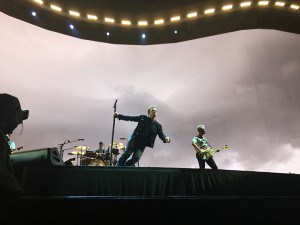
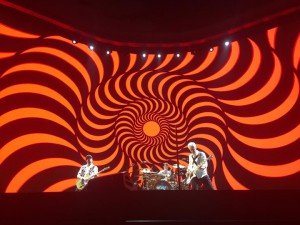
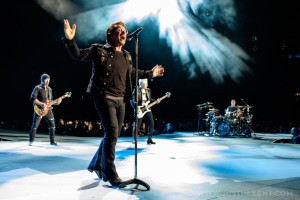
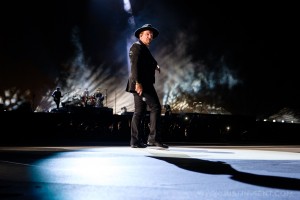
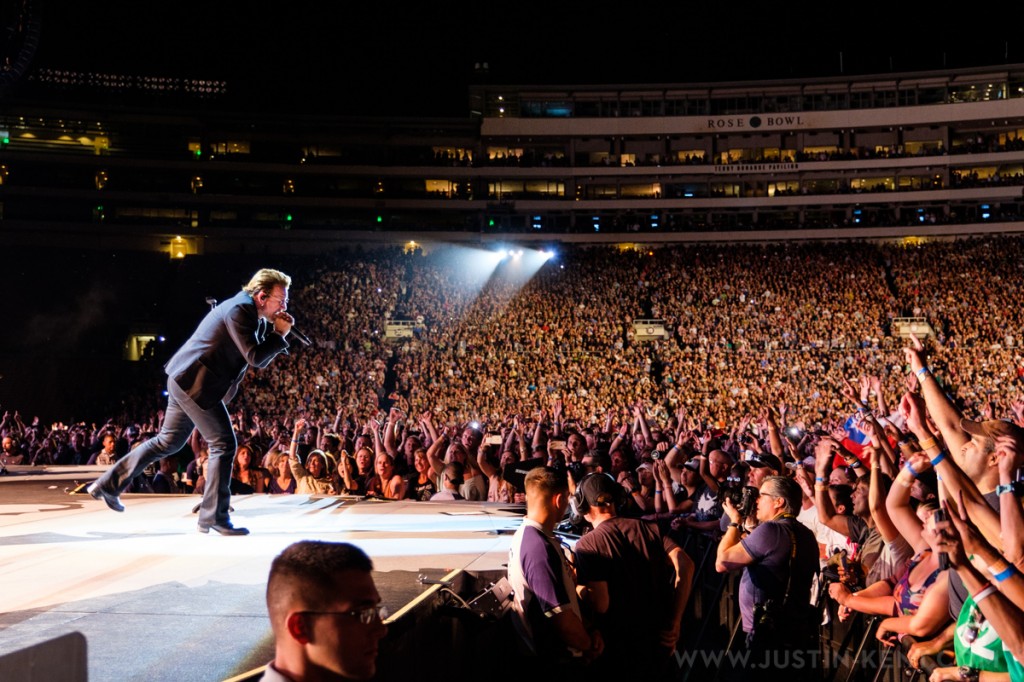
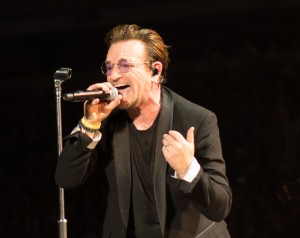

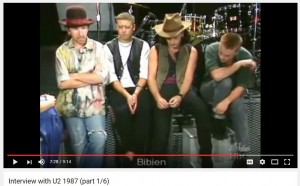
Recent Comments